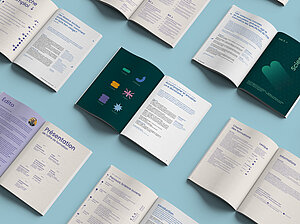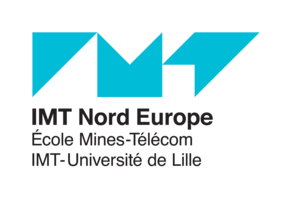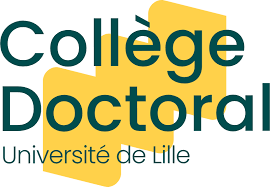Doctoral Training

All doctoral students preparing a thesis are required to undergo professional doctoral training
This training aims to provide a high level of scientific and professional qualification and demonstrate the skills acquired during the three years of doctoral studies
The selection of training courses should be based on the student's career plan and discussed with their thesis supervisor. If needed, the recommendations of the individual examining committees (CSI) can also be taken into account
The ED SMRE is responsible for its students' doctoral training
It is affiliated with the Doctoral College of the University of Lille, which provides a platform for international activities and professional training
The Areas of Training Covered at the GS SMRE
Doctoral training is flexibly divided into three areas :
- Scientific: doctoral courses, master courses, summer school, etc
- International: languages, mobility, modules dealing with general tools, etc
- Professionalising: training courses offered by the Careers and Employment Department of the Doctoral College, Doctoriales® (French doctoral seminar days), etc
You must validate 60 training credits and only 30 in the case of international joint supervision
During doctoral studies, ethics training is mandatory and strongly recommended from the first year. MOOC courses taught at Bordeaux, Lyon, and Paris-Saclay universities are available on the ADUM Network (see the section below)
The ADUM catalogue offers a wide range of training courses. You can also validate training courses that are not yet in the catalogue by adding details to the ADUM network (e.g., MOOCs, other universities or doctoral schools, labs, etc.)
The choice of training courses can be included in the Individual Training Agreement (CIF), which can be amended every year, as required
THE TRAINING PLAN
Download the Terms and Conditions of the Training Plan (in French, PDF, 661 kB).
Ethics and scientific integrity ensure honest and responsible research practices and maintain quality. They also take into account the impact of scientific activities on society
- Professional ethics refer to the set of explicit and implicit standards that dictate behaviour and relationships in a particular profession or industry
- Scientific integrity is a form of ethics concerned with the best practices or standards of professional practice of researchers
The universities of Bordeaux, Lyon and Paris-Saclay all offer MOOCs on ethics and scientific integrity that the ED SMRE recommends exploring
- FUN MOOC "Intégrité scientifique dans les métiers de la recherche" de l'Université de Bordeaux
- FUN MOOC "Éthique de la recherche" de l'Université de Lyon
- FUN MOOC "Ethics & STICs" de l'Université Paris Saclay
For researchers, following approval by the Graduate School Council on 15 December 2023, a certificate of successful completion of one of these courses will be required for all new thesis applications from the start of the 2025 academic year.
See also the page dedicated to scientific integrity for the University of Lille - Ethics and data protection in research: Cycle of lectures on ethics and data protection in research (POD platform)
Need more information? You can :
- Find out about the university bodies involved in research ethics: the Committee for the Protection of Individuals and the Research Ethics Committee
- Distinguish between research involving the human person and research not involving the human person
See also the page dedicated to scientific integrity at ITM North Europe
The ED SMRE raises doctoral students' awareness of the challenges of open science and research dissemination in society to foster stronger ties between scientists and citizens.
- MOOC on "Open Science" taught by the University of Sorbonne = 8 hours over 4 weeks -> 5 credits
This MOOC offers training at a self-paced rate in the challenges and practices of open science. Thirty-eight contributors, including ten doctoral candidates from research and documentation services, have contributed to this course.
Other training courses are available at Lilliad: https://bu.univ-lille.fr/chercheurs-doctorants/science-ouverte
- a series of video clips covering the contents of the Passport
- a booklet entitled Enter the debate
- a Codes and Software booklet
- and a Research Data guide
All the resources in the collection are available in French and English, in web and print versions.
The Passport to Open Science collection is published by the Ministry of Higher Education and Research and produced by the Open Science Committee and the University of Lille.
Passport for Open Science - A Practical Guide for PhD Students / Passeport pour la Science Ouverte | Guide pratique à l'usage des doctorantes et des doctorants
The catalogue of professional doctoral training courses for 2025–2026 is structured around seven thematic areas:
-
Career pathways
-
Professional project development
-
Skills development and valorisation
-
Science and society
-
Sustainable development and social responsibility
-
Digital training
-
Open science
In 2025–2026, a total of 113 training courses are offered:
-
84 courses delivered in French
-
29 courses delivered in English
-
6 conferences
-
16 new courses
The objective is to help you identify and showcase a portfolio of competencies, encompassing both your field of expertise and your transferable skills.
Most of these activities are led by external consultants from the private sector.
-
Professional Doctoral Training Catalogue 2025–2026
Digital version: https://www.calameo.com/books/007821105962e7b9846eb
Registration is completed via your personal ADUM account.
Please consult the FAQ related to the training courses, where you will find answers to general questions about the training programme.
The SMRE ED offers specialised and/or interdisciplinary courses to broaden students' knowledge throughout their courses
You may take part in the locally taught master's courses in physics, chemistry, ecology, earth sciences, the universe, and the environment
Participation in master's courses can lead to doctoral training credits (1 credit for 2 hours with a maximum of 20 credits obtained in such a way)
The description of the catalogue courses is available on ADUM
You can contact the corresponding DED beforehand to check the relevance of the course to your studies
Registration is processed by the master's course coordinators, and registration for participation on ADUM is required for validation of credits by your doctoral school
Certificate of participation in training courses (masters and English courses) for doctoral candidates, to be returned signed to: sec-edsmre@univ-lille.fr (in French, PDF, 138 kB)
Doctoral School Training Courses Catalogue
Languages:
You can take introductory language classes (in English or German): 2 additional modules of 30 hours each are organised every year
Module 1:
- Preparation for the TOEIC Exam
- Telephone Communication in English (case studies)
- Introducing Yourself
- Presenting a Project, a Lab or a Company
- Public Speaking and Managing a Meeting
- Travelling and Communication
Module 2:
- Telephone Communication in English (case studies)
- Presenting an Experiment or a Process
- Presenting a Product with Visual Aids
- CV Writing Workshop
- Cover Letter Writing Workshop
- Managing Job Interviews
- Selling a Product or Service
- Negotiating
As part of your doctorate, you will participate in many off-catalogue activities and training courses. If any of the courses you've taken relate to your thesis work, you can validate them as part of your doctoral training by simply adding them to your Portfolio on ADUM
However, before doing so, it's advisable to contact your DED to find out whether these courses can be counted as part of your training program
Once you've confirmed that the course can be counted, you should submit a certificate of attendance issued by the lecturer or the Admin Office, stating your surname, first name, course title and the number of hours of classes taken in the off-catalogue training courses tab on ADUM
Funding Application for Training or Mobility in France
If you meet certain conditions, the doctoral school may offer funding for training courses
To apply, you need to provide information about the course and the trip (including the place, date, and nature of the event) and a complete estimate of the costs, which should include travel expenses, accommodation, and any registration fees
You must submit your application to the school before the course begins, using the form provided :
Funding Application for Training (in French, Word, 317 kB)
Graduate Programmes at the University of Lille
The University of Lille's graduate programmes provide an immersive research environment and equip you with interdisciplinary skills to tackle subject-specific challenges
Presentation of the Graduate Programmes (Video presentation -WebTV - 20 April 2021 | Duration 47:50)
- Information and Knowledge Society ("Société de l’information et de la connaissance")
- Science for a Changing Planet ("Innovation au service d’une planète en mutation")
- Precision Health ("Santé de Précision")
- Changing Cultures, Societies, Practices ("L'évolution des cultures, des sociétés et des pratiques")
The graduate programmes are listed in the University of Lille Course Catalogue
Follow our graduate programmes on Facebook
To meet the eligibility criteria, you must have acquired at least 60 credits (30 credits in case of joint supervision)
Additionally, the 60 credits should be obtained with a minimum of 10 credits in each field of study
The more time and effort you invest in your course, the more credits you will acquire
You can review your courses and credits once a year with your DED





